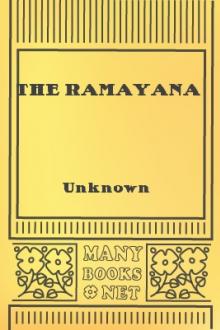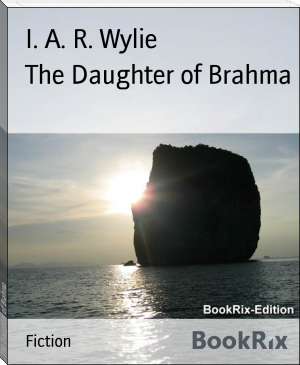The Ramayana - Valmiki (best ereader for epub txt) 📗

- Author: Valmiki
- Performer: -
Book online «The Ramayana - Valmiki (best ereader for epub txt) 📗». Author Valmiki
tei-l" style="text-align: left">Why in thy tender heart allow
This bitter grief to harbour now?
As the long banks of cloud distil
Their water when they see the hill,
[pg 147]
So shall the drops of rapture run
From thy glad eyes to see thy son
Returning, as he lowly bends
To greet thee, girt by all his friends.”
Thus soothing, kindly eloquent,
With every hopeful argument
Kauśalyá's heart by sorrow rent,
Fair Queen Sumitrá ceased.
Kauśalyá heard each pleasant plea,
And grief began to leave her free,
As the light clouds of autumn flee,
Their watery stores decreased.
Canto XLV. The Tamasá.
Their tender love the people drew
To follow Ráma brave and true,
The high-souled hero, as he went
Forth from his home to banishment.
The king himself his friends obeyed,
And turned him homeward as they prayed.
But yet the people turned not back,
Still close on Ráma's chariot track.
For they who in Ayodhyá dwelt
For him such fond affection felt,
Decked with all grace and glories high,
The dear full moon of every eye.
Though much his people prayed and wept,
Kakutstha's son his purpose kept,
And still his journey would pursue
To keep the king his father true.
Deep in the hero's bosom sank
Their love, whose signs his glad eye drank.
He spoke to cheer them, as his own
Dear children, in a loving tone:
“If ye would grant my fond desire,
Give Bharat now that love entire
And reverence shown to me by all
Who dwell within Ayodhyá's wall.
For he, Kaikeyí's darling son,
His virtuous career will run,
And ever bound by duty's chain
Consult your weal and bliss and gain.
In judgment old, in years a child,
With hero virtues meek and mild,
A fitting lord is he to cheer
His people and remove their fear.
In him all kingly gifts abound,
More noble than in me are found:
Imperial prince, well proved and tried—
Obey him as your lord and guide.
And grant, I pray, the boon I ask:
To please the king be still your task,
That his fond heart, while I remain
Far in the wood, may feel no pain.”
The more he showed his will to tread
The path where filial duty led,
The more the people, round him thronged,
For their dear Ráma's empire longed.
Still more attached his followers grew,
As Ráma, with his brother, drew
The people with his virtues' ties,
Lamenting all with tear-dimmed eyes.
The saintly twice-born, triply old
In glory, knowledge, seasons told,
With hoary heads that shook and bowed,
Their voices raised and spake aloud:
“O steeds, who best and noblest are,
Who whirl so swiftly Ráma's car,
Go not, return: we call on you:
Be to your master kind and true.
For speechless things are swift to hear,
And naught can match a horse's ear,
O generous steeds, return, when thus
You hear the cry of all of us.
Each vow he keeps most firm and sure,
And duty makes his spirit pure.
Back with our chief! not wood-ward hence;
Back to his royal residence!”
Soon as he saw the aged band.
Exclaiming in their misery, stand,
And their sad cries around him rang,
Swift from his chariot Ráma sprang.
Then, still upon his journey bent,
With Sítá and with Lakshmaṇ went
The hero by the old men's side
Suiting to theirs his shortened stride.
He could not pass the twice-born throng
As weariedly they walked along:
With pitying heart, with tender eye,
He could not in his chariot fly.
When the steps of Ráma viewed
That still his onward course pursued,
Woe shook the troubled heart of each,
And burnt with grief they spoke this speech—
“With thee, O Ráma, to the wood
All Bráhmans go and Bráhmanhood:
Borne on our aged shoulders, see,
Our fires of worship go with thee.
Bright canopies that lend their shade
In Vájapeya319 rites displayed,
In plenteous store are borne behind
Like cloudlets in the autumn wind.
No shelter from the sun hast thou,
And, lest his fury burn thy brow,
These sacrificial shades we bear
Shall aid thee in the noontide glare.
Our hearts, who ever loved to pore
On sacred text and Vedic lore,
Now all to thee, beloved, turn,
And for a life in forests yearn.
Deep in our aged bosoms lies
The Vedas' lore, the wealth we prize,
There still, like wives at home, shall dwell,
Whose love and truth protect them well.
[pg 148]
To follow thee our hearts are bent;
We need not plan or argument.
All else in duty's law we slight,
For following thee is following right.
O noble Prince, retrace thy way:
O, hear us, Ráma, as we lay,
With many tears and many prayers,
Our aged heads and swan-white hairs
Low in the dust before thy feet;
O, hear us, Ráma, we entreat.
Full many of these who with thee run,
Their sacred rites had just begun.
Unfinished yet those rites remain;
But finished if thou turn again.
All rooted life and things that move
To thee their deep affection prove.
To them, when warmed by love, they glow
And sue to thee, some favour show,
Each lowly bush, each towering tree
Would follow too for love of thee.
Bound by its root it must remain;
But—all it can—its boughs complain,
As when the wild wind rushes by
It tells its woe in groan and sigh.
No more through air the gay birds flit,
But, foodless, melancholy sit
Together on the branch and call
To thee whose kind heart feels for all.”
As wailed the aged Bráhmans, bent
To turn him back, with wild lament,
Seemed Tamasá herself to aid,
Checking his progress, as they prayed.
Sumantra from the chariot freed
With ready hand each weary steed;
He groomed them with the utmost heed,
Their limbs he bathed and dried,
Then led them forth to drink and feed
At pleasure in the grassy mead
That fringed the river side.
Canto XLVI. The Halt.
When Ráma, chief of Raghu's race,
Arrived at that delightful place,
He looked on Sítá first, and then
To Lakshmaṇ spake the lord of men:
“Now first the shades of night descend
Since to the wilds our steps we bend.
Joy to thee, brother! do not grieve
For our dear home and all we leave.
The woods unpeopled seem to weep
Around us, as their tenants creep
Or fly to lair and den and nest,
Both bird and beast, to seek their rest.
Methinks Ayodhyá's royal town
Where dwells my sire of high renown,
With all her men and dames to-night
Will mourn us vanished from their sight.
For, by his virtues won, they cling
In fond affection to their king,
And thee and me, O brave and true,
And Bharat and Śatrughna too.
I for my sire and mother feel
Deep sorrow o'er my bosom steal,
Lest mourning us, oppressed with fears,
They blind their eyes with endless tears.
Yet Bharat's duteous love will show
Sweet comfort in their hours of woe,
And with kind words their hearts sustain,
Suggesting duty, bliss, and gain.
I mourn my parents now no more:
I count dear Bharat's virtues o'er,
And his kind love and care dispel
The doubts I had, and all is well.
And thou thy duty wouldst not shun,
And, following me, hast nobly done;
Else, bravest, I should need a band
Around my wife as guard to stand.
On this first night, my thirst to slake,
Some water only will I take:
Thus, brother, thus my will decides,
Though varied
Free e-book «The Ramayana - Valmiki (best ereader for epub txt) 📗» - read online now
Similar e-books:





Comments (0)